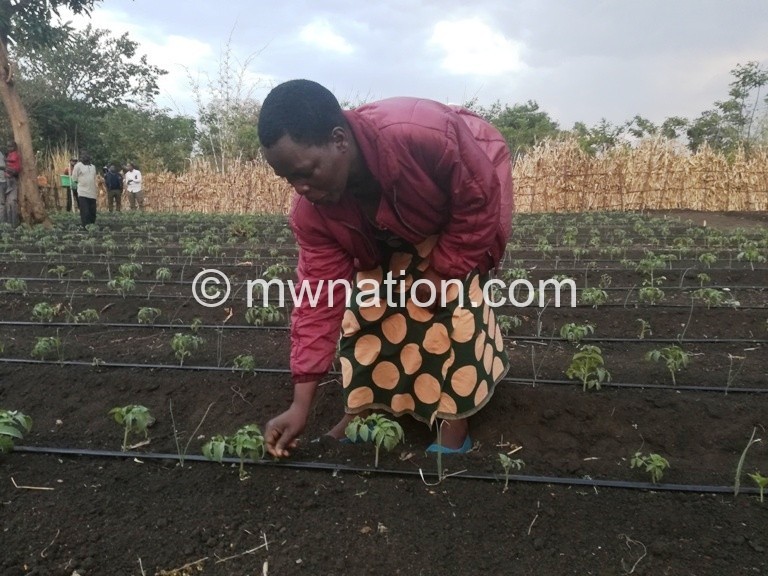For women who feed Africa
Women form the backbone of rural economies, growing over two-thirds of food for Africa’s 1.2 billion people.
From a subsistence farmer hoeing her crop field in scorching sunshine with a baby on her back to her counterpart selling basketfuls and truckloads of fresh harvests in every market, they contribute immensely to Africa’s growth and food security as Covid-19 prevention urges them to stay home.

Yet these heroes, who produce, process and deliver the vital offerings, seldom get adequate recognition and rewards though they constitute 70 percent of Africa’s agricultural labour force.
In 2019, UN Women and Standard Bank joined hands to help 50 000 women farmers in Malawi, Uganda, South Africa and Nigeria benefit more from agriculture despite the harsh impacts of climate change, including drought, floods and cyclones.
“This is a partnership of two like-minded organisations that believe that empowering women is not just a prerequisite for gender equality but also just financial inclusion,” says Standard Bank Group head of agribusiness, corporate and investment banking Linda Manda.
The target women are hard at work, reaping the fruits of the push for global Sustainable Development Goals to combat poverty, hunger, gender inequalities and climate change by 2030.
“I have benefited a lot from my cooperative since I joined in 2017. With climate-smart ways of farming, I will get bumper yields of groundnuts,” says Ruth Deodato of Gwiritse Club in Traditional Authority Kabudula in Lilongwe.
The group of 154 women and 88 men has stopped growing maize alone as the staple’s yields dwindle due to changing rainfall patterns fuelled by climate change as well as soil degradation and poor farming methods.
The programme oriented the farmers to make farming choices that increase crop yield.
“In Malawi, food is maize, but the rainfall pattern is no longer predictable. The rainy season that used to start in October now delays for a month or two and prolonged dry spells kick in before maize tassels, leaving us with inadequate grain to take us to the next harvest,” says Deodato.
Standard Bank has injected K340 million, offering 6 000 Malawian women like her drought-resistant seed varieties, modern farming technologies and attractive markets as climate shocks become more frequent.
The climate-smart agriculture initiative underway in Lilongwe Mchinji, Mzimba and Karonga is part of the K2.2 billion project contributing to the economic empowerment of women in Africa.
Some 2 300 Nigerian women received support to increase the productivity and profitability, particularly in the rice and nut value chains. In Uganda, 1 400 women acquired business management training and mentorship programmes as well as feed and other inputs for fish farming.
In South Africa, the continent’s worst-hit Covid-19 hotspot, 2 700 women farmers received farm inputs such as drought-resistant seed varieties, organic manure, equipment and training on smart agriculture, despite nationwide lockdowns to stop the pandemic.
Bonolo Maqeba, who mentors 35 women farmers in South Africa, says African women in the agricultural value chain have limited access to land, modern technologies, research and market opportunities and farm machinery.
“Women are also often confined by the local market, which is more of a low-price environment than the urban market where men go,” she adds.
Covid-19 has complicated the situation. Maqeba narrates: “Climate-smart agriculture is still in formative stages, so the lockdowns have been a huge setback. One day, we were in the normal and another we were in turmoil; we couldn’t go to the field or gather in to share knowledge.
“This has affected management of our fields, access to information and marketing of farm produce as transport has become expensive.”
Maqeba backs climate-smart agriculture which lessens soil erosion and the burden of tilling using hand-held tools while increasing yield— come rain or dry spells.
Nidhi Tandon, UN Women socio-economic adviser for southern Africa, says climate-resilient farming has more positives than traditional monocropping which suck soil water and fertility without replenishing it.
“UN Women thinks conservation farming or climate-smart agriculture is important because it enables farmers and their communities to mitigate the impacts of climate change and pursue technologies that limit greenhouse emissions and the dependence on fossil fuels, pesticides and fertiliser,” she says.
Tandon ays women form the frontline in climate change adaptation and mitigation.
“Being climate resilient will require men and women to use the technologies that are at hand today and those that are just around the corner in future, including hybrid seed, smart ICTs, early warning systems, insurance packages and deliberate balancing of growing for the mouth and markets without compromising our environmental heritage,” she states.
Standard Bank Malawi head of relationship banking Graham Chipande says the financial institution is committed to helping women farmers unleash their potential.
“Apart from financing barriers, their biggest challenge is access to information on soil health, good practices and access to markets. This manifests itself as a high risk. When we value it, it starts to exclude many rural farmers, especially women,” he says, hoping the women will rise in the value chain to become buyers, off takers and processors.
The project shows the financial sector can deliver solutions while conserving nature.
“Not only does it make ecological sense to ensure our survival but also financial sense to improve food security, livelihoods and progress,” says Chipande.





